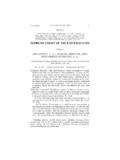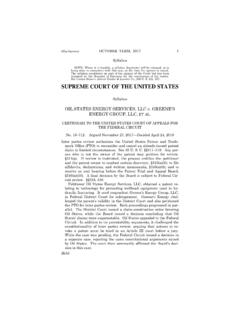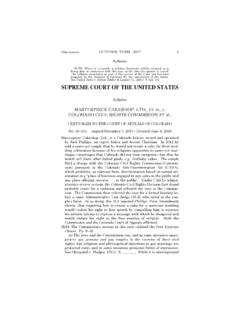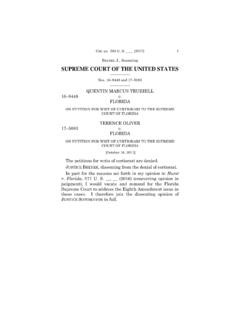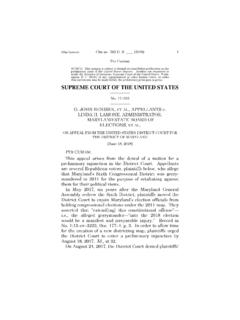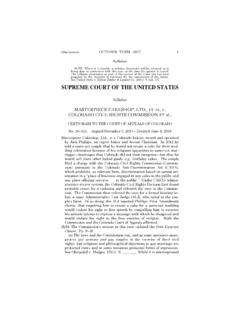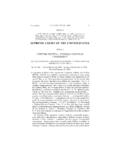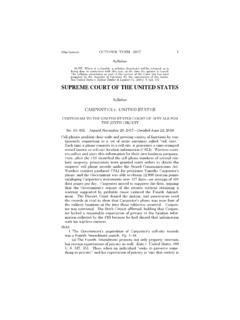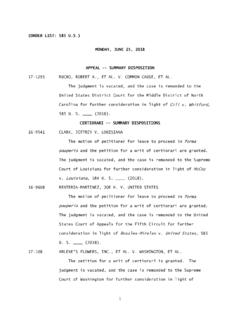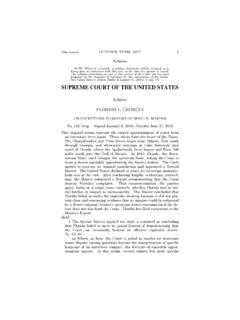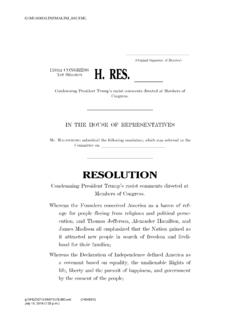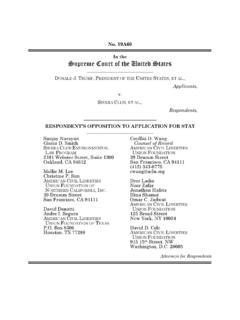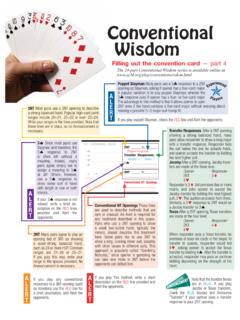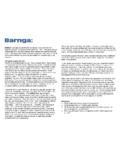Transcription of SUPREME COURT OF THE UNITED STATES
1 1 (Slip Opinion) OCTOBER TERM, 2017 Syllabus NOTE: Where it is feasible, a syllabus (headnote) will be released, as isbeing done in connection with this case, at the time the opinion is syllabus constitutes no part of the opinion of the COURT but has beenprepared by the Reporter of Decisions for the convenience of the reader. See UNITED STATES v. Detroit Timber & Lumber Co., 200 U. S. 321, 337. SUPREME COURT OF THE UNITED STATES Syllabus trump , PRESIDENT OF THE UNITED STATES , ET AL. v. HAWAII ET AL. CERTIORARI TO THE UNITED STATES COURT OF APPEALS FOR THE NINTH CIRCUIT No.
2 17 965. Argued April 25, 2018 Decided June 26, 2018 In September 2017, the President issued Proclamation No. 9645, seek-ing to improve vetting procedures for foreign nationals traveling tothe UNITED STATES by identifying ongoing deficiencies in the infor-mation needed to assess whether nationals of particular countries present a security threat. The Proclamation placed entry restrictions on the nationals of eight foreign STATES whose systems for managing and sharing information about their nationals the President deemedinadequate. Foreign STATES were selected for inclusion based on a re-view undertaken pursuant to one of the President s earlier ExecutiveOrders.
3 As part of that review, the Department of Homeland Securi-ty (DHS), in consultation with the State Department and intelligence agencies, developed an information and risk assessment baseline. DHS then collected and evaluated data for all foreign governments,identifying those having deficient information-sharing practices andpresenting national security concerns, as well as other countries at risk of failing to meet the baseline. After a 50-day period during which the State Department made diplomatic efforts to encourage foreign governments to improve their practices, the Acting Secretaryof Homeland Security concluded that eight countries Chad, Iran, Iraq, Libya, North Korea, Syria, Venezuela, and Yemen remaineddeficient.
4 She recommended entry restrictions for certain nationals from all of those countries but Iraq, which had a close cooperative re-lationship with the U. S. She also recommended including Somalia,which met the information-sharing component of the baseline stand-ards but had other special risk factors, such as a significant terrorist presence. After consulting with multiple Cabinet members, the Pres-ident adopted the recommendations and issued the Proclamation. 2 trump v. HAWAII Syllabus Invoking his authority under 8 U.
5 S. C. 1182(f) and 1185(a), he de-termined that certain restrictions were necessary to prevent the en-try of those foreign nationals about whom the UNITED STATES Gov-ernment lacks sufficient information and elicit improved identity-management and information-sharing protocols and practices from foreign governments. The Proclamation imposes a range of entry re-strictions that vary based on the distinct circumstances in each ofthe eight countries. It exempts lawful permanent residents and pro-vides case-by-case waivers under certain circumstances. It also di-rects DHS to assess on a continuing basis whether the restrictions should be modified or continued, and to report to the President every 180 days.
6 At the completion of the first such review period, the Pres-ident determined that Chad had sufficiently improved its practices,and he accordingly lifted restrictions on its the State of Hawaii, three individuals with foreign rela-tives affected by the entry suspension, and the Muslim Association ofHawaii argue that the Proclamation violates the Immigration andNationality Act (INA) and the Establishment Clause. The District COURT granted a nationwide preliminary injunction barring enforce-ment of the restrictions. The Ninth Circuit affirmed, concluding thatthe Proclamation contravened two provisions of the INA: 1182(f),which authorizes the President to suspend the entry of all aliens orany class of aliens whenever he finds that their entry would bedetrimental to the interests of the UNITED STATES , and 1152(a)(1)(A),which provides that no person shall.
7 Be discriminated against inthe issuance of an immigrant visa because of the person s race, sex, nationality, place of birth, or place of residence. The COURT did not reach the Establishment Clause claim. Held: 1. This COURT assumes without deciding that plaintiffs statutory claims are reviewable, notwithstanding consular nonreviewability or any other statutory nonreviewability issue. See Sale v. Haitian Cen-ters Council, Inc., 509 U. S. 155. Pp. 8 The President has lawfully exercised the broad discretion grant-ed to him under 1182(f) to suspend the entry of aliens into the Unit-ed STATES . Pp. 9 24.(a) By its terms, 1182(f) exudes deference to the President inevery clause.
8 It entrusts to the President the decisions whether and when to suspend entry, whose entry to suspend, for how long, and onwhat conditions. It thus vests the President with ample power to impose entry restrictions in addition to those elsewhere enumeratedin the INA. Sale, 509 U. S., at 187. The Proclamation falls well with-in this comprehensive delegation. The sole prerequisite set forth in 1182(f) is that the President find[ ] that the entry of the covered al- 3 Cite as: 585 U. S. ____ (2018) Syllabus iens would be detrimental to the interests of the UNITED STATES .
9 The President has undoubtedly fulfilled that requirement here. He first ordered DHS and other agencies to conduct a comprehensive evaluation of every single country s compliance with the informationand risk assessment baseline. He then issued a Proclamation with extensive findings about the deficiencies and their impact. Based on that review, he found that restricting entry of aliens who could not bevetted with adequate information was in the national interest. Even assuming that some form of inquiry into the persuasivenessof the President s findings is appropriate, but see Webster v. Doe, 486 U. S. 592, 600, plaintiffs attacks on the sufficiency of the findingscannot be sustained.
10 The 12-page Proclamation is more detailedthan any prior order issued under 1182(f). And such a searching in-quiry is inconsistent with the broad statutory text and the deferencetraditionally accorded the President in this sphere. See, , Sale, 509 U. S., at 187 188. The Proclamation comports with the remaining textual limits in 1182(f). While the word suspend often connotes a temporary de-ferral, the President is not required to prescribe in advance a fixedend date for the entry restriction. Like its predecessors, the Procla-mation makes clear that its conditional restrictions will remain in force only so long as necessary to address the identified inadequa-cies and risks within the covered nations.
